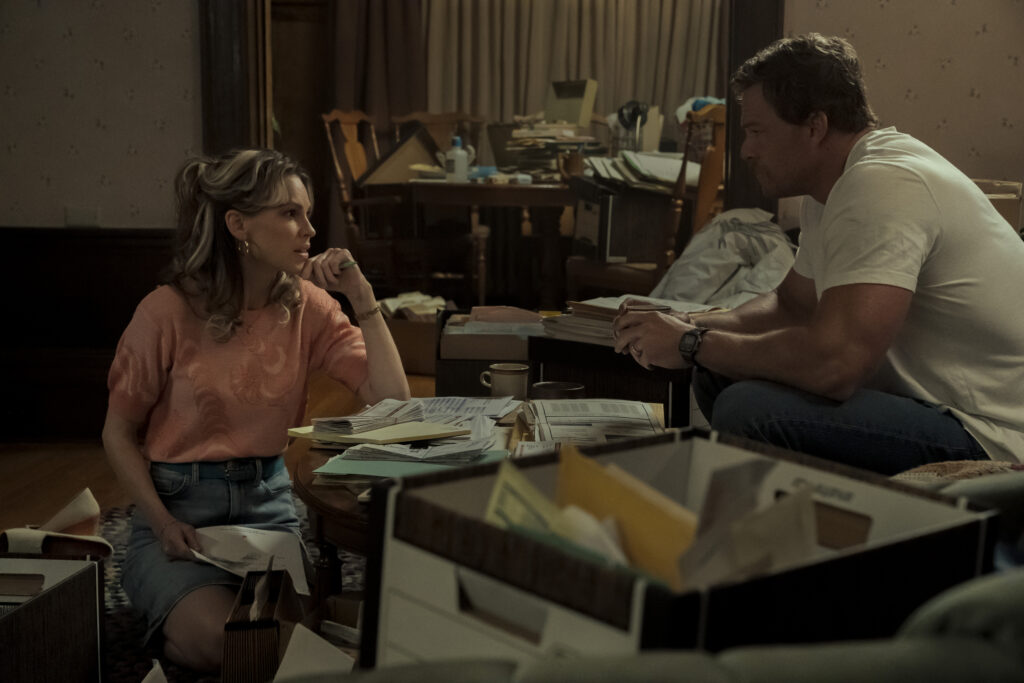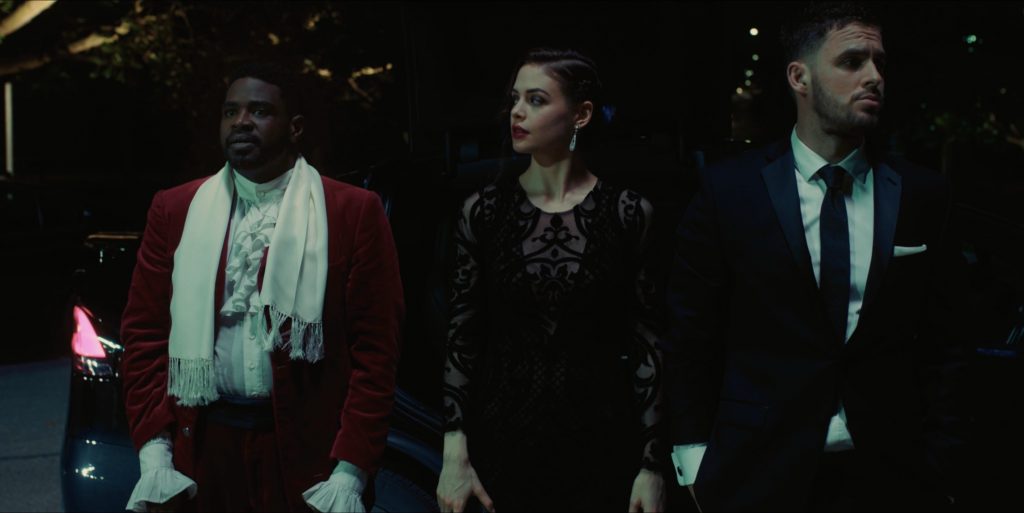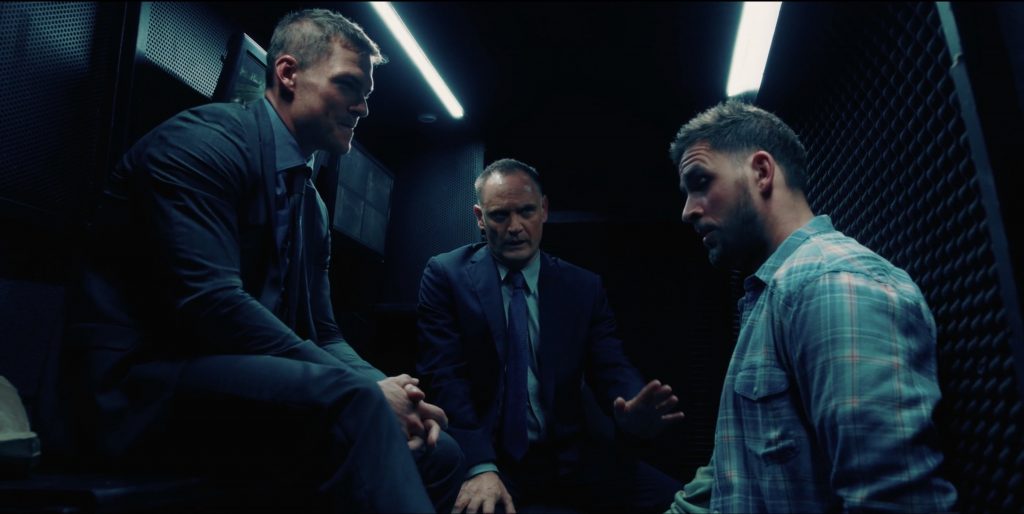April 14, 2024
by Carla Hay

“The Ministry of Ungentlemanly Warfare”
Directed by Guy Ritchie
Culture Representation: Taking place in 1942, in the United Kingdom, Fernando Po (now known as Bioko), the Canary Islands, and the Atlantic Ocean, the action film “The Ministry of Ungentlemanly Warfare” (based on true events) features a predominantly white cast of characters (with some black people, a few Asian people and one Latina) representing the working-class, middle-class and wealthy.
Culture Clash: A group of rogues, who are secretly recruited by the U.K. government, team up with U.K. government spies in a plan to defeat Nazi German U-boats in the Atlantic Ocean.
Culture Audience: “The Ministry of Gentlemanly Warfare” will appeal primarily to people who are fans of filmmaker Guy Ritchie, the movie’s headliners, and unimaginative action movies taking place during World War II.

“The Ministry of Ungentlemanly Warfare” could have been a superb film for history-based movies that take place during World War II. Instead, this tedious spy-and-combat clunker has bland dialogue, mediocre action scenes, and hollow main characters. There’s also gross sexism in how the token female character’s purpose is literally described as “seducer” in the movie. “The Ministry of Ungentlemanly Warfare” is so biased and inaccurate with its machismo, there is only one woman who has a significant speaking role in this disappointing film, which diminishes or erases the large number of women who made important contributions to World War II. Out of all the cast members who have character names in the movie, only two are women, and one of them has only a few minutes of screen time.
Directed by Guy Ritchie, “The Ministry of Ungentlemanly Warfare” was written by Ritchie, Paul Tamasy, Eric Johnson and Arash Amel. The movie’s screenplay is adapted from Damien Lewis’ 2015 non-fiction book “The Ministry of Ungentlemanly Warfare: How Churchill’s Secret Warriors Set Europe Ablaze and Gave Birth to Modern Black Ops,” which is based on true events revealed in declassified documents. A caption in the beginning of the movie says that the story is based on former U.K. Prime Minister Winston Churchill’s files that were declassified in 2016, the year after Lewis’ aforementioned book was published. This book is not to be confused with Giles Milton’s 2015 non-fiction book “Churchill’s Ministry of Ungentlemanly Warfare.”
Ritchie has made a career out of directing male-oriented action movies, but the quality of these movies has gone downhill since his best films in the 2000s, even if the budgets for Ritchie’s movies have been noticeably higher in subsequent decades. The one time that Ritchie had a woman as the lead character in a feature film that he directed—2002’s terrible romantic drama “Swept Away,” starring Madonna, who was married to Ritchie at the time—it was a disastrous flop on every single level.
It’s unknown if the failure of “Swept Away” turned Ritchie off from ever doing a movie again where a woman is the central protagonist. However, his filmmaking track record indicates he’s only comfortable directing movies where women are the supporting characters and are usually tokens whose roles are either “wife,” “girlfriend” or “seductress,” while the male characters in Ritchie’s films get to have the most fun. “The Ministry of Ungentlemanly Warfare” is just more of the same sexist pattern.
“The Ministry of Ungentlemanly Warfare” (which takes place in 1942) unfolds in an unnecessarily convoluted way that drags down the pace of the movie. The movie’s opening scene shows a British-owned boat in the Atlantic Ocean’s “Nazi-controlled waters” being overtaken by Nazis. The Nazi commanding officer (played by Jens Grund) coldly announces to the boat’s captured men that he usually gives detainees on a ship or boat the choice of either jumping overboard or taking their chances when the vessel is set on fire.
As the vessel is about to be destroyed by Nazi arson, the captured boat occupants fight back and kill the Nazis. After they defeat these villains, they blow up the Nazi ship nearby. Who are these men with almost superhero-like fighting skills? They are a motley crew of rogues and renegades who will soon be recruited by the Churchill-led U.K. government to defeat Nazi German U-boats in the Atlantic Ocean.
And all of these “heroes” happen to unrealisitically look like extremely good-looking actors. The group’s leader is a dashing Brit named Gus March-Phillips (played by Henry Cavill), who does his fair share of posing and smirking throughout the movie. Gus is the type of leader who doesn’t pass up the chance to make wisecracking quips, but the “jokes” in this movie mostly fall flat. These “jokes” might elicit a few short chuckles but nothing that will turn into sustained laugh-out-loud moments.
Gus has a group of guys he likes to work with and who all have shady pasts like he does. They include Anders Lassen (played Alan Ritchson), who is described as a Danish “legend with a bow and arrow” and an “uncontrollable mad dog”; Freddy Alvarez (played by Henry Golding), who is a convicted arsonist; and Henry Hayes (played by Hero Fiennes Tiffin), an Irishman whose brother was killed in a U-boat sunk by the Nazis. The characters of Gus March-Phillips and Anders Lassen are based on real people with the same names, although the real Gus March-Phillipps had a slightly different spelling of his last name. Henry Hayes is based on the real-life Graham Hayes. Freddy Alvarez is a character fabricated for this movie.
Another member of this rebellious group is Geoffrey Appleyard (played by Alex Pettyfer), a Brit who is described as “a master planner, a master survivor, a master surgeon” and “an expert with a blade.” Geoffrey Appleyard is also based on a real person with the same name. In this movie, Geoffrey isn’t quite the master planner he is described as, because he’s gotten himself captured in a Nazi prison in the Canary Islands’ La Palma. Guess who’s going to break him out of this prison?
Before this prison breakout scene happens, there are some choppily edited scenes showing how this “ministry” was formed during World War II. Despite Gus’ tension-filled and rocky history with the U.K. government, Prime Minister Churchill (played by a miscast Rory Kinnear) wants Gus to lead a secret group of operatives who will be on a mission to defeat Nazi German U-boats in the Atlantic Ocean, near Fernando Po, an Equatorial Guinea island which is now known as Bioko.
Gus is summoned to Special Operations Executive headquarters in London, where he meets with Prime Minister Churchill and four other people who are in this office meeting: Brigadier Gubbins, nicknamed M (played by Cary Elwes); spy Ian Fleming (played by Freddie Fox); spy Marjorie Stewart (played by Eiza González); and spy Richard Heron (played by Babs Olusanmokun), who is called Heron in the movie. Brigadier Gubbins is based the real-life major-general Colin McVean Gubbins. The characters of Ian Fleming and Marjorie Stewart are also based on real people. Heron is a character who was fabricated for the movie.
One of the worst things about this movie is that it doesn’t tell much about Ian Fleming, who would later become famous in real life as the author of James Bond novels. In “The Ministry of Ungentlemanly Warfare,” Ian Fleming has a blank personality. Marjorie is described as an “actress, singer and seducer” with German Jewish heritage on her mother’s side of the family. Heron’s main claim to fame is that he throws great parties. Marjorie and Heron are the spies who have the most contact with Gus and his gang.
The mission is so secretive, most British military officials don’t know about it. Therefore, people on the mission are warned that they not only must avoid being captured by Nazis, they also must avoid being arrested by British officials. Brigadier Gubbins is stereotypically a bureaucrat type who inevitably clashes with the more freewheeling Gus. Brigadier Gubbins is supposed to be Gus’ direct supervisor on this mission, but Gus naturally resists this authority.
It should be noted that “The Ministry of Ungentlemanly Warfare” is not as integrated as it appears to be. For a great deal of the movie, especially in the first half, Margorie and Heron (who is black) work together and do not interact with the other people on the team. It’s an off-putting way of showing “let’s put the woman and black person over there, and everyone else can go over here.” When Margorie and Heron eventually do work directly with Gus and his group, it looks very contrived for the movie.
Margorie had a fascinating story in real life, including a marriage to Gus that is only mentioned in the movie’s epilogue. Unfortunately, in this movie, Margorie is reduced to being a “sexpot sidekick” who occasionally uses a gun. Fans of González can at least take comfort in knowing that González does the best that she can with a limited role. And for what it’s worth, Marjorie has the best costumes in the movie, even if those costumes predictably include dresses where she has to show her breast cleavage. It should come as no surprise that Marjorie has been tasked with seducing a Nazi German official named Henrich Luhr (played Til Schweiger), who has valuable information about the U-boats that the hero team wants to sink.
Heron is suave and has many friends, but his role in the movie is to provide “the entertainment,” while other people do the most difficult planning for the mission. There’s a messy section of the movie where Heron has arranged two parties happening at the same time: a costume party for Nazi officers (where Marjorie dresses as Cleopatra, and she convinces Luhr to dress as Julius Caesar) and “beerfest” for Nazi soldiers. The purpose of both parties is to keep a certain dock mostly unguarded so that the “ministry” can complete its mission.
Gus and his gang of rogues (in other words, the characters in the movie who get to do the most action) are unfortunately written in generic ways where very little is told about who they are. Hardly anything is shown that proves Gus’ cronies have unique and distinct personalities, so the cast members act accordingly. Gus is not as charismatic as he thinks he is.
Likewise, the government officials also have lackluster depictions. At one point, Prime Minister Churchill says to subordinates about this mission against the Nazis: “I need you to air raid their ships … Hitler is not playing by the rules, and neither are we.” Yawn.
Kinnear is a skilled actor, but he can’t overcome the obvious flaw of looking too young to portray Prime Minister Churchill during this period of time. “The Ministry of Ungentlemanly Warfare” takes place in 1942, when Churchill was 67 or 68 years old. Kinnear was in his mid-40s when he portrayed Churchill in “The Ministry of Ungentlemanly Warfare.” The filmmakers didn’t bother to make Kinnear look like the same age as Churchill was during this period of time. This age inaccuracy doesn’t ruin the movie, because Churchill is not a central character in this film, but it’s a noticeable flaw.
“The Ministry of Ungentlemanly Warfare” has a tone-deaf way of glossing over a lot of Nazi bigotry. The movie has an attitude of “let’s not show any of the racist and religious hate that Nazis inflicted on people” in “The Ministry of Ungentlemanly Warfare”—as if it’s assumed it’s sufficient enough to just label the Nazis as the antagonists. “The Ministry of Ungentlemanly Warfare” is not a Holocaust movie, and it doesn’t have to be a lecture about the evils of Nazis’ hate, but it’s not a very responsibly made history-based film showing the damage of Nazi prejudice and hate crimes. For example, there’s a scene on a train where a uniformed Nazi has a cordial conversation with Margorie and Heron. In real life, a uniformed Nazi probably would not have been as polite and would most likely have tried to assert some type of bigoted superiority over these obviously non-Aryan people.
As for the action sequences, “The Ministry of Ungentlemanly Warfare” doesn’t do anything spectacular. There isn’t even a credible attempt at building suspense. It’s just a “checklist/countdown” movie that goes from one location to the next, until the predictable conclusion. (“The Ministry of Ungentlemanly Warfare” was filmed in the United Kingdom and in the Republic of Türkiye, also known as Turkey.)
The film editing isn’t very impressive. There are too many scenes that are meant to show how “globetrotting” this movie is, but all that’s shown in several (not all) international scenes are a few minutes of dialogue that didn’t really need to be in the movie. The dialogue in this film is mostly forgettable, which is why the movie’s characters come across as cardboard personalities instead of authentic people. “The Ministry of Ungentlemanly Warfare” has an attractive and talented cast, but putting them in various locations with a flimsy story does not magically turn this shallow mediocrity into a well-made or compelling movie.
Lionsgate will release “The Ministry of Ungentlemanly Warfare” in U.S. cinemas on April 19. 2024. Sneak previews of the movie were shown in select U.S. cinemas on April 8, 2024, and on April 13, 2024.




